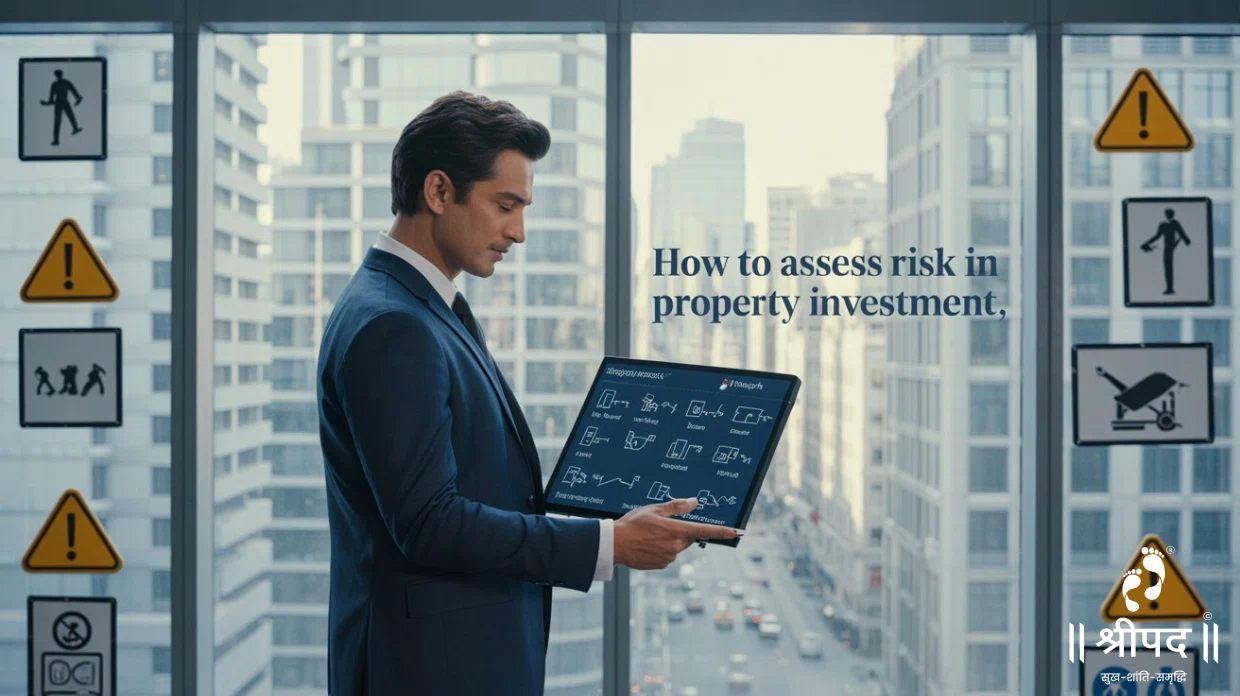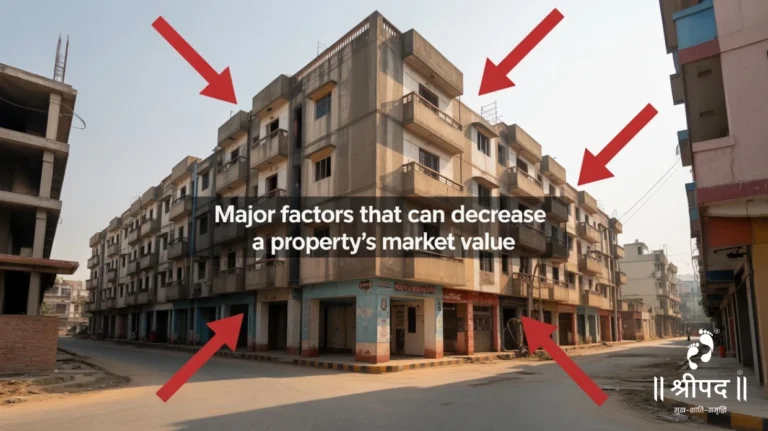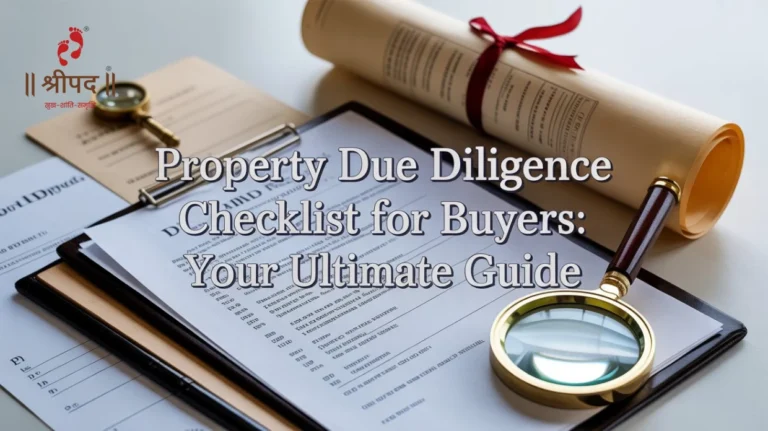- SHREEPAD GROUP
-
+91 83476 68000

Real estate has long been recognized as a dependable way to create and grow wealth. Whether it’s residential apartments, commercial buildings, or mixed-use projects, property investments can provide attractive returns, rental income, and long-term appreciation. But just like any other form of investment, real estate is not risk-free. The most successful investors are those who carefully evaluate and manage risks before committing their money.
This article explains the different types of risks associated with property investment, how to assess them, and practical strategies to make smarter, safer investment decisions.
Why Risk Assessment Matters in Real Estate
Unlike stocks or bonds, real estate requires larger financial commitments and is not always easy to liquidate quickly. This makes risk assessment a critical step. By carefully analyzing risks, investors can:
- Safeguard their capital from potential losses.
- Identify locations and projects with the highest growth potential.
- Ensure healthy cash flows from rental income.
- Make better financing decisions and avoid over-leverage.
- Build a balanced and diversified portfolio.
In short, evaluating risks not only protects investments but also helps investors align property purchases with their long-term financial goals.
Common Risks in Property Investment
Real estate investments can be impacted by a wide range of factors. Here are the major risks every investor should be aware of:
Market Risks
Property values and rental demand can fluctuate depending on economic cycles, employment trends, and oversupply in the market. A downturn could reduce both rental income and resale value.
Location Risks
The location of a property heavily influences its appreciation potential. Areas with poor infrastructure, limited job opportunities, or safety issues are riskier than prime neighborhoods with strong growth prospects.
Financial Risks
Financing a property through loans introduces risks like rising interest rates, repayment challenges, or negative cash flow if rental income doesn’t cover expenses.
Legal and Regulatory Risks
Zoning restrictions, disputes over property titles, or non-compliance with local building laws can derail even the most promising investment. Ignoring legal due diligence can be costly.
Construction Risks
Projects under development carry risks such as delays, budget overruns, and quality issues. These directly affect timelines and return on investment.
Tenant Risks
For rental properties, risks include tenant defaults, frequent vacancies, or challenges in attracting reliable occupants.
Environmental Risks
Floods, earthquakes, and other natural disasters can damage property and impact long-term appreciation. With climate change, environmental factors are becoming increasingly important.
Steps to Assess Risk in Property Investment
To make smarter real estate decisions, investors should take a structured approach to risk assessment. Here’s how:
1. Research the Market Thoroughly
Start by analyzing demand, supply, and pricing patterns in the area you are considering. Key points include:
- Historical property price trends.
- Rental yield comparisons.
- Occupancy levels in the region.
- Growth drivers such as industries, IT hubs, and business centers.
- Future projects like metro lines, highways, or airports.
For example, in Surat, infrastructure projects and the textile industry are strong indicators of real estate growth.
2. Evaluate the Location
The golden rule of real estate—location is everything—still holds true. Check for:
- Connectivity to transport and highways.
- Access to healthcare, schools, and entertainment.
- Neighborhood quality and safety.
- Upcoming government projects.
- Historical growth of property prices in the area.
3. Check Financial Viability
A sound financial plan reduces risks significantly. Focus on:
- Loan-to-Value Ratio (LTV): Avoid over-leverage by keeping LTV low.
- Interest Rate Impact: Consider scenarios of rising interest rates.
- Cash Flow Estimates: Compare rental income with loan EMIs, maintenance, and taxes.
- Exit Strategy: Always have a backup plan for early exit if required.
Along with these, it’s equally important to track the essential metrics every property investor must monitor to ensure your investment continues to perform well in changing market conditions.
4. Verify Legal Documentation
Legal due diligence is non-negotiable. Ensure:
- The property has a clear title and proper ownership documents.
- Necessary approvals from municipal and state authorities are in place.
- Compliance with zoning and land-use regulations.
- RERA registration for under-construction projects (in India).
- No pending disputes or litigation.
5. Assess the Developer’s Track Record
For new or under-construction projects, the developer’s credibility is crucial. Review:
- Delivery track record on past projects.
- Quality standards of completed developments.
- Financial stability of the company.
- Feedback from past buyers.
Choosing a reputable real estate property developer in Surat such as Shreepad Group ensures trust, transparency, and timely delivery.
6. Use Scenario Planning
Run simulations to test how the investment performs under different conditions:
- What happens if rents fall by 10%?
- What if property values stagnate for several years?
- Can you still sustain payments if interest rates rise?
This helps gauge how resilient your investment is to uncertainties.
7. Factor in Property Management
A poorly managed property can erode returns. If you are not available to manage tenants and maintenance, consider hiring a professional property management service.
8. Review Environmental Factors
Check whether the location is prone to flooding or earthquakes. Look for sustainability features like rainwater harvesting, solar power, and green certifications that boost long-term property value.
Risk Reduction Strategies for Investors
Assessing risks is the first step—managing them effectively is equally important. Here are some proven ways to minimize risks:
- Diversify Your Investments: Spread funds across different types of properties (residential, commercial, industrial).
- Take a Long-Term Approach: Real estate usually delivers the best returns when held for several years.
- Work with Trusted Developers: Opt for projects by reputed names like Shreepad Group to reduce development-related risks.
- Maintain Emergency Reserves: Keep funds aside for unexpected repairs, tenant defaults, or EMI shortfalls.
- Insure Your Property: Property insurance provides financial protection against disasters or damages.
- Stay Informed: Regularly follow real estate market updates and policy changes that may affect investments.
Example: Assessing Risk in Surat’s Property Market
Imagine an investor evaluating a new residential apartment in Surat:
- Market Research: Rental returns average around 4–5%, supported by demand from professionals in the textile and diamond industries.
- Location: The property is strategically near an upcoming metro corridor and IT zone, boosting its long-term potential.
- Financial Analysis: With an LTV ratio of 60% and healthy cash flow projections, the investment looks financially sound.
- Legal Check: The project is RERA registered with clear documentation.
- Developer Reputation: The project is by Shreepad Group, a leading developer known for quality and timely delivery.
With this structured risk analysis, the investor gains confidence in moving forward, knowing the investment is backed by strong fundamentals.
Final Thoughts
Property investment can be one of the most rewarding ways to build wealth, but only if risks are carefully analyzed. From market conditions and financing to legal checks and developer reliability, every detail matters. By conducting due diligence and planning for uncertainties, investors can minimize risks and maximize returns.
Cities like Surat offer excellent opportunities, but the key lies in working with trusted partners who combine experience with transparency.
Looking to invest in property but want the confidence of working with a trusted name? Shreepad Group is a reputed real estate property developer in Surat with a history of delivering quality, value-driven projects. Explore our residential and commercial developments today and secure your future with a safe and rewarding investment.
See Related News & Insights Blog

09.10.2025
How to Select the Right Property Type to Suit Your Needs
Purchasing a property is one of the most important financial decisions you can make. Whether it’s your first home, an...

09.10.2025
Essential Tips for Investing in a Growing Real Estate Market
Investing in real estate can be one of the smartest financial decisions when approached with knowledge and strategy. A thriving...

09.10.2025
Major Factors That Can Decrease a Property’s Market Value
In the real estate world, property value is more than just a number — it reflects the strength of your...

09.10.2025
Property Due Diligence Checklist for Buyers: Your Ultimate Guide
Purchasing a property is one of the biggest investments in life. Whether it’s a residential apartment, a commercial space, or...
